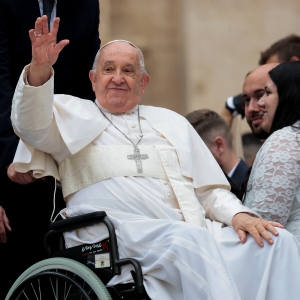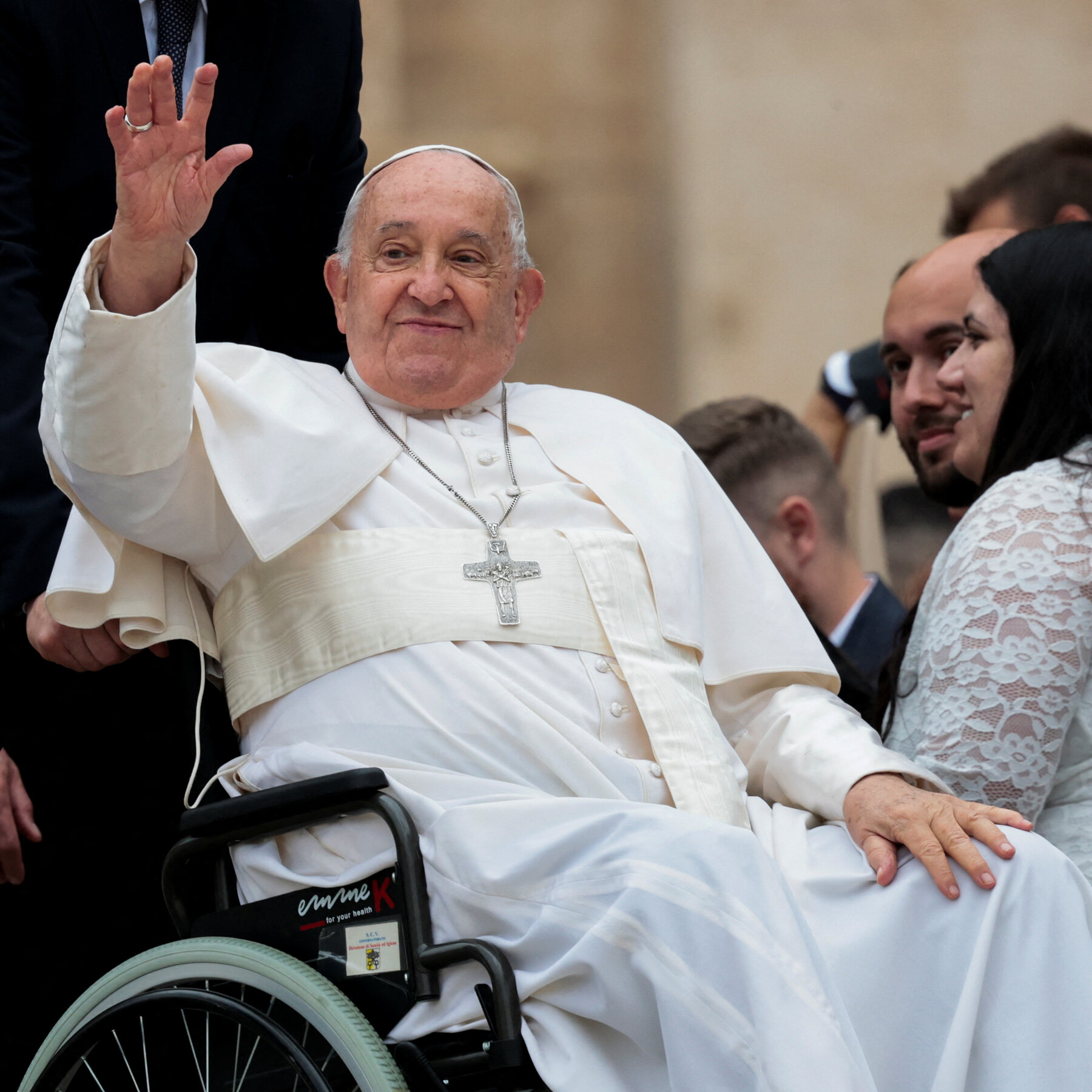
.png) Cedric Prakash
Cedric Prakash

About a month ago, on 15 October, the 2024 Global Hunger Index was released. India ranks 105 out of 127 countries; with a score of 27.3, India has a level of hunger that is serious. On that day, a World Bank report stated that "almost 129 million Indians are living in extreme poverty in 2024, on less than $2.15 (about Rs 181) a day." These are hard facts by independent agencies, which the Government of India cannot find fault with. These statistics should not surprise anyone: whilst India boasts of producing some of the wealthiest persons in the world, the fact is that millions of Indians still do not have access to roti-kapda-makaan (food-clothing-shelter), clean drinking water and the other basic amenities of life. Theirs is a journey of survival, struggling to eke out a living!
So, as the Universal Church observes the VIII World Day of the Poor, the one consideration that must be uppermost in the hearts and minds of every disciple of Jesus is: "the poor cry out to us: do we respond?" If we do so, we must analyse the nature of our response. Pope Francis has based his message this year on the theme, "The prayer of the poor rises up to God" (cf. Sir 21:5). He says, "The World Day of the Poor has now become a fixture for every ecclesial community. It is a pastoral opportunity not to be underestimated, for it challenges every believer to listen to the prayer of the poor, becoming aware of their presence and needs. It is an opportune occasion to implement initiatives that concretely help the poor and to recognise and support the many volunteers who dedicate themselves passionately to those most in need. We must thank the Lord for the people who make themselves available to listen to and support the poorest among us". The message of Pope Francis is his usual incisive style. For him, the cry (their prayer) of the poor has a message for all of us! Just as God does, we need to listen to their prayer, but God also wants us to respond proactively and help alleviate their poverty.
The first of the Sustainable Development Goals (SDGs) is to 'End poverty in all its forms everywhere' - something that has to be achieved by 2030! That is indeed a tall order, but if there is the political will to do so, that seemingly ideal goal can certainly be achieved. In the context of this goal, the UN says, "In 2020, the number of people living in extreme poverty (living on less than USD 2.15 a day) rose to 724 million. Those living in extreme poverty struggle to fulfil the most basic needs (health, education, access to water and sanitation)," adding, "Eradicating poverty in all its forms remains one of the greatest challenges facing humanity. While the number of people living in extreme poverty dropped by more than half between 1990 and 2015 – from 1.9 billion to 731 million – too many are still struggling for the most basic human needs".
In January 2023, OXFAM released its report "Survival of the Richest" at the World Economic Forum in Davos. It highlighted the enormous disparity in wealth distribution in India, which makes the country one of the most unequal countries in the world, grappling with soaring levels of both income and wealth inequality. The report says that more than 40% of the wealth created in the country from 2012 to 2021 had gone to just 1% of the population; the richest 10% of the Indian population lay claim to an astonishing 77% of the nation's wealth. Only 3% of the country's wealth had trickled down to the bottom 50%. In 2022, the wealth of India's richest man, Gautam Adani, increased by 46%, while the combined wealth of India's 100 richest had touched USD 660bn (approx. 55 lakh crore rupees). These scandalous statistics must make any Indian with a conscience hang one's head down in shame.
India's youth continue to grapple with soaring unemployment rates, with nearly 83% of the jobless population belonging to this demographic, as per the India Employment Report 2024 jointly published by the International Labour Organisation (ILO) and the Institute of Human Development (IHD). The report (released on 27 March 2024) underscores a concerning trend: the proportion of educated young people possessing at least secondary education among the total unemployed youth has nearly doubled from 35.2% in 2000 to 65.7% in 2022.
The Adivasis/Tribals (Indigenous people), who constitute a sizable section of India's population, are denied their jal-jungle-zameen (water-forests-land) and other legitimate rights. Thousands of them are displaced because of mega-projects. Primary education in the remote tribal villages is non-existent, and so is medical care for them; a large percentage of tribals have to migrate to urban areas / other states in search of employment. Besides them, most migrant workers continue to be excluded and exploited! The plight of the Dalits, the OBCs leave much to be desired; untouchability is practised everywhere; manual scavenging still exists; the reality of the safai kamdars is pathetic.
Christian "charity" is no longer synonymous with the traditional "doling out." It is easy to throw a pittance at the poor, to give them our leftover food or old clothes. Today, we are mandated to address the system/structural issues of poverty to empower the poor through a rights-based approach. In 2009, with his path-breaking Encyclical "Caritas in Veritate," Pope Benedict XVI redefined the meaning of 'charity' stating "Charity in truth, to which Jesus Christ bore witness by his earthly life and especially by his death and resurrection, is the principal driving force behind the authentic development of every person and of all humanity. Love — caritas — is an extraordinary force which leads people to opt for courageous and generous engagement in the field of justice and peace."
The Synodal Report of the first phase (October 2023) has a section dedicated to 'People in Poverty, Protagonists of the Church's Journey (I.4). The Convergences include f) The Church's commitment must address the causes of poverty and exclusion. This includes actions to protect the rights of those who are excluded, and this may require public denunciation of injustices, whether perpetrated by societal structures or by individuals, corporations or governments. Listening to their demands and points of view and utilising their own words is essential to hearing the voices of those in poverty.
In Matters for Consideration is j) Prophetic denunciation of situations of injustice, on the one hand, and efforts to persuade policymakers to act for the common good, which require recourse to diplomacy, on the other, must be maintained in a dynamic tension so as not to lose a clear focus or fruitfulness. In particular, care must be taken to ensure that the use of public or private funds by Church bodies does not limit the freedom to speak up for the demands of the Gospel.
Given the above, to address the realities of the poor and their powerlessness, to become truly a Synodal Church, we need to internalise a way of proceeding, which includes:
Awareness
The first step towards involvement is knowing what is happening to the poor and marginalised, the excluded and exploited, and other vulnerable sections of society. We should be aware of the powerful and other vested interests and how they manipulate the poor for their own greed. Above all, we must be aware of how structures and systems, policies and legislations keep people impoverished.
Attitude
Self-conversion is fundamental. Very often, our attitude towards the poor differs greatly from that towards the rich. It does not matter if the latter is the most corrupt person or the biggest land shark in the area. We will give that person the most extraordinary deference possible. Let us call to mind the way we higgle-haggle for just two rupees with a poor fisherwoman when we go to buy fish, thinking we are being cheated; will we bargain when we go to a supermarket, knowing fully well that we are being cheated of 200 rupees?
Accompany
We are called to accompany the poor and powerless in our quest for a more humane, just, dignified and equitable life. The poor constitute a significant section of society: they are small farmers and indigenous coastal people (our fisherfolk), casual labourers and migrant workers, the Adivasis, Dalits and OBCs, the homeless and unemployed youth, the slum-dwellers, the other genders and many more. They must be told about their legitimate rights and access to government schemes/programmes that benefit them. To help get them an identity card. To walk with them as 'pilgrims of hope'!
Articulation is being visible and vocal, and it is important to study and document facts, such as how the government is pro-rich/ in the grips of some of the big corporates and other vested interests and does not cater to the poor. Government policies (like mining/ cutting down forests/use of fossil fuels) destroy the environment and make the poor poorer. It is prophetic courage to come out on the streets, join civil society groups in rallies and campaigns on behalf of the poor, and write to daily newspapers/magazines and online portals on what is happening to the poor.
Advocacy is all the above and much more! It means challenging anti-people legislation/ policies. For example, the three farm laws and the four labour codes are patently discriminatory and against the interests of the poorer sections of society. For this, we must collaborate and network with others, join people's movements and use social media. Above all, we should not be afraid to take a stand for the poor, the powerless, and those without a voice.
Towards the end of his message, Pope Francis emphasises, "As we journey towards the Holy Year, I urge everyone to become pilgrims of hope, setting tangible goals for a better future. Let us not forget to keep 'the little details of love': stopping, drawing near, giving a little attention, a smile, a caress, a word of comfort. These gestures are not automatic; they require a daily commitment and are often hidden and silent, but strengthened by prayer. In this time, when the song of hope seems to give way to the clamour of arms, to the cry of many innocent wounded, and the silence of the countless victims of wars, we turn to God with our plea for peace."
The poor cry out to us today. Do we have the prophetic courage to respond to them in a proactive way and accompany them in their struggle for a more just, equitable, humane, hope-filled world?